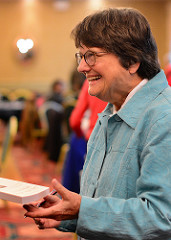Podcast: Play in new window | Download (Duration: 41:41 — 57.3MB)
Subscribe: Spotify | RSS | More


Sister Helen Prejean is a well-known anti-death penalty advocate who has ministered to prisoners on death row. She began her prison ministry in 1981 by becoming pen pals with Patrick Sonnier, a convicted murder who was sentenced to death by electrocution in Lousiana’s Angola State Prison.
Since then, she has witnessed 5 executions and founded the victim’s advocacy group “Survive” in New Orleans. She continues to counsel inmates on death row as well as the families of murder victims. Sister Prejean speaks out against the death penalty through lecturing, organizing and writing, and she is the author of two books on the subject. Dead Man Walking: An Eyewitness Account of the Death Penalty in the United States was an international best seller, and it was developed into the 1996 motion picture for which Susan Sarandon won an Oscar for best actress.
Her second book, The Death of Innocents: An Eyewitness Account of Wrongful Executions, tells the story of two men whom she accompanied to their executions. That book examines the evidence uncovered in those investigations, including evidence no jury ever heard, and sought to illuminate the flaws that can lead to the deaths of innocent people.
When Sister Prejean visited the University of Iowa, Erin Renfrew, Ethan Forsgren, Corbin Weaver, and Greg Yungtum saw an opportunity to talk with her about why the death penalty is something medical students should think about and understand.
Special thanks to the UI Center for Human Rights and the University of Iowa’s Just Living Theme Semester for sharing Sister Helen Prejean with us.
Your Hosts This Week:
[huge_it_gallery id=”78″]
Listen to more great shows for medical students on The Vocalis Podcast Network.




